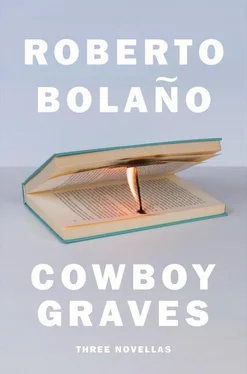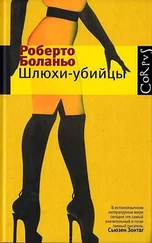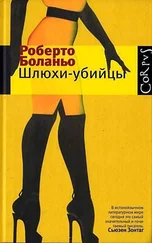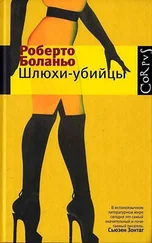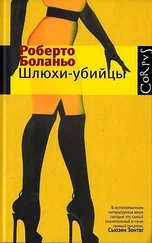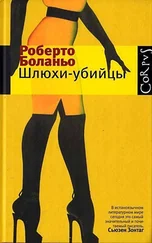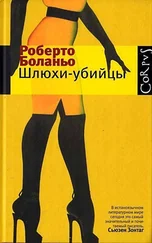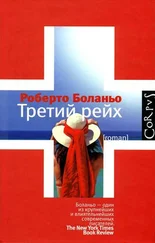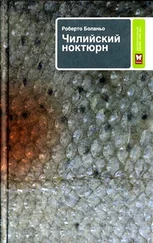One of the two of us had to admit defeat, but neither Pancho nor I was willing. Asking, answering; utterly lost to each other.
FRENCH COMEDY OF HORRORS

For Lautaro and Alexandra Bolaño
That day, if I’m not mistaken, was the day of the eclipse. We, the friends of Roger Bolamba, had settled down at the House of the Sun, a soda fountain that is, or was, at the curve of the seaside promenade along the stretch officially known as avenue Colonel Goffin. As we waited for the spectacle of the eclipse, we talked about poetry and politics, which was what we always talked about anyway. We had chosen a table next to the window overlooking the cliff, which wasn’t the best seat in the house, but it wasn’t bad either. Though it was true that the waiters hardly paid any attention to us and served us last, Bolamba presided over the table with his usual dignity and we—who were young and inexperienced back then—felt like princes.
Next to our table was a guy in a white cotton blazer, black shirt, and bloodred tie. He was big, six feet tall at least, and he was drinking rum with Guyanita-Cola. With him were two women. One was older, and she was looking all around, as if the festive atmosphere at the House of the Sun scared her. The other was much younger, and every so often she cuddled up to the well-dressed guy, whispering words that I couldn’t quite make out.
I remember the guy because when the eclipse started he got up from his table and started to dance, staring straight at the sun (the rest of us were all looking at it through film negatives or special sunglasses, and some of us even had bits of dark glass, probably pieces of beer bottles), and after a few seconds the older woman joined him in a kind of chacona or resbalosa , a galleada maybe or a sombrilla , a dance that was somehow anachronistic but at the same time terrifying, and that, according to Bolamba, was known only deep in the northern rain forests, in other words the poorest and most remote parts of the country, the malarial forests, the half-abandoned villages near the border where dengue and superstition ruled.
But that wasn’t all. On the one hand, the sun was gradually dimming until it went completely black. On the other hand, the well-dressed guy and the older woman were dancing a sombrilla , which sometimes seemed more like a resbalosa , or a chacona (because of the precision of the steps), or a galleada (because of the obscene moves), singing softly and watching the solar show without blinking. They looked like two people possessed, not in a violent way, but in a resigned, bureaucratic way. The girl, oblivious to the eclipse, had eyes only for them, as if their highly predictable spins were the most interesting thing happening. I should also say that of all the people pressing their noses to the glass at the House of the Sun, it’s possible (though I may be presuming too much) that, other than the girl, I was the only one watching what was happening inside as well as out. When the eclipse was over, we all—those of us in Roger Bolamba’s circle, that is—held our breath and clapped. The other patrons followed our lead and the applause was universal and thunderous. Even the well-dressed guy stopped dancing and bowed with a flourish, submissive and sardonic. Just then the older woman cried out.
“I’ve gone blind!” she shouted.
The waiters at the House of the Sun, who were watching the sky from behind tinted glasses, looked at her and laughed. The well-dressed guy patted the air, searching for the body of the older woman, who had sat down on the floor. The girl got up from the table and took him by the hand.
“The eclipse is over,” she said. “Now we can go, love.”
With a jab of my elbow, I alerted my friend David Alan to what was happening behind his back, but after glancing at the three people attracting my attention, he turned back to the otherworldly darkness blowing over the streets and hills of Port Hope. Then the girl helped the older woman up from the floor, calling her mamá , mother, life-giver, madam, señora , sainted lady, as tears spilled down her cheeks. What an absurd performance, I remember thinking. The well-dressed guy, sitting at the table again, wound a shiny wristwatch, which certainly didn’t look cheap. I turned away. The sea below had suddenly grown calm and the tide, according to Roger Bolamba, didn’t know whether to come in or go out. We heard a dog bark. Past the cliff, where the promenade runs along the beach, we saw a man walk into the water and then swim out to the buoy. The buildings on the waterfront seemed to have shifted, tilting slightly toward the south, like psychopathic Towers of Pisa. The few clouds plying the sky of Port Hope had disappeared. A sound like charcoal against dry wood, like stone against gem, imperceptibly scored the air of the capital. Roger Bolamba, who had been the one to invite us to the soda fountain, said that we would watch the next solar eclipse in bathing trunks on the beach, and then we would follow the example of the swimmer who was making his way toward the buoy.
“When is the next eclipse?” asked someone I didn’t recognize.
“Thirty years from now,” said David Alan.
When I turned to look at the well-dressed guy and the women with him, they were gone. Then the sun shone again through the windows and most of us pocketed the devices we had used to protect our eyes from the dangerous rays of the blazing orb (or tossed them on the floor), except for the waiters, who were still wearing their glasses at work five years later, starting a trend that was gradually picked up by hotel waiters, beach restaurant waiters, and finally dance club waiters.
The rest of the afternoon proceeded as usual: somebody wrote a sonnet to the eclipse; somebody compared the eclipse to the state of the arts in our country; somebody said that children conceived during an eclipse were born with birth defects or just flat-out evil, which meant that it wasn’t a good idea to make love during an eclipse, total or partial. Then it was time to pay and we all dug into our pockets. As usual, somebody was out of cash, or didn’t have enough, or hadn’t brought cash with him, and among all of us, democratically, we had to cover what he’d ordered, a beer, a coffee, a dish of pineapple preserves. Nothing very expensive, as you can see, though when you’re poor anything that isn’t free is expensive.
Later, the owner of the soda fountain—who respected Bolamba’s past as an athlete and grudgingly accepted his new literary calling—ordered us to leave, which we did willingly, since there was no air conditioning at the House of the Sun and by then the heat had become unbearable. Our conversation continued at De Gaulle Park, the biggest park in the city, where we sprawled on the green grass that no one had cut for more than a month, as Alcides La Mouette pointed out, because of the strike of city contractors, which included gardeners and caretakers, but not garbagemen, whose work regulations were different. So the grass was taller than usual (much taller) and we lay down in it, Roger Bolamba and the five or six of us who followed him everywhere, as the pot and amphetamine dealers settled on the cement or stone benches that had replaced the original cast-iron benches, which someone had stolen and sold to the rich and cultivated families of our city.
As always, we read aloud the news published in the literary section of the Port Hope Monitor , dreary news, the names of academics who had gone on to better places, the names of others who were still swarming the basements of the Ministry of External Affairs or the Ministry of Health and Social Welfare, occupied with complex heuristic challenges. Alongside them, shining bright, were the young people (though some of these young people were past fifty) who would replace them, though for the moment they spent their time writing about the flora and fauna of our republic. It was they whom Roger Bolamba most hated or envied, because they were of his generation and they were, to a certain extent, those directly responsible for his marginal position in national literary circles. As always, we laughed at their poems, we laughed at their translations (there was one of a German writer that made him sound like a stuttering Creole), we laughed at their reviews, dithyrambic in most cases, affected paeans to the masters with nods to colleagues or friends. Then the sun began to set and a breeze blew from the south and we all went with Bolamba to his house, which was by the port, a little fisherman’s house, where books jostled for space with the cups and medals that our mentor had won over the course of his long athletic career.
Читать дальше
